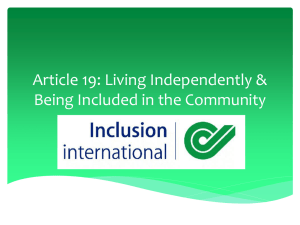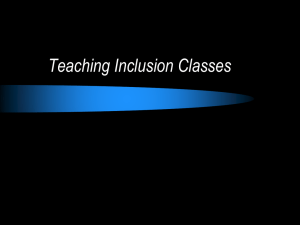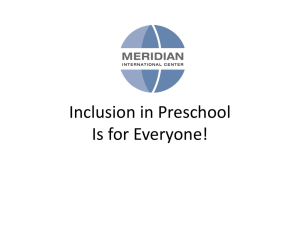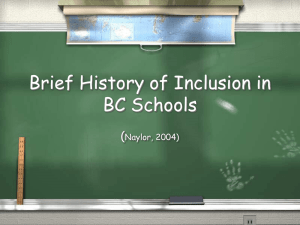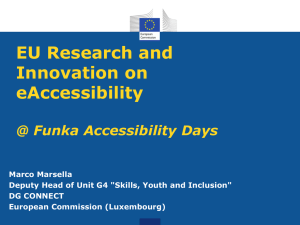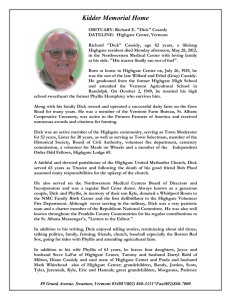How we support children / young people with special educational
advertisement
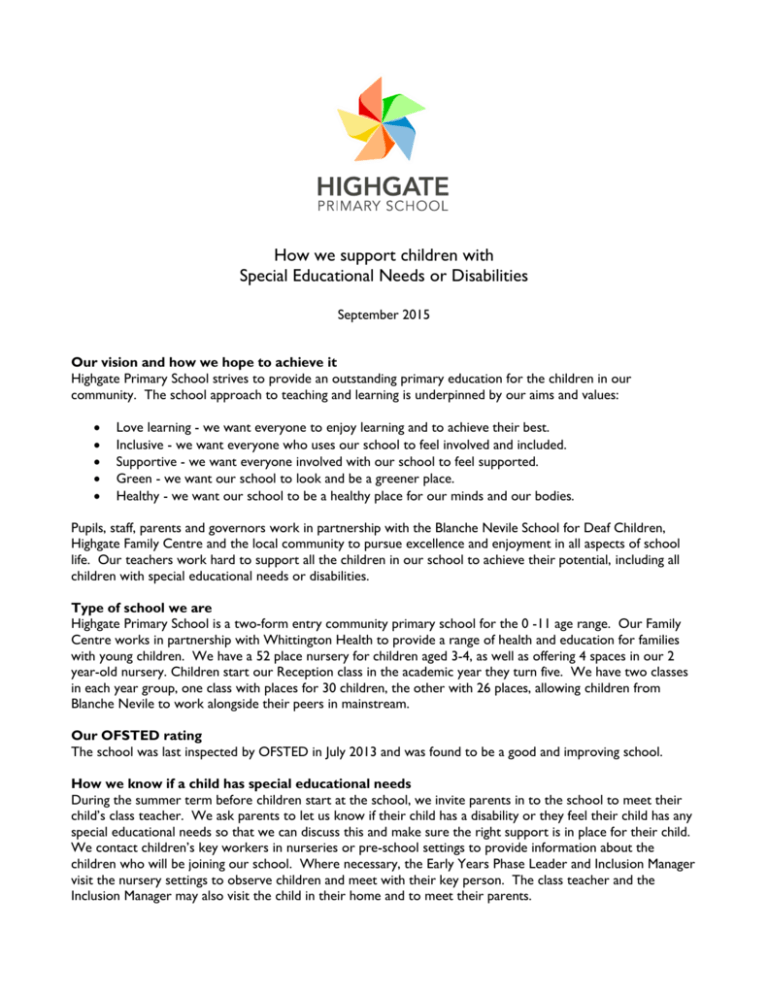
How we support children with Special Educational Needs or Disabilities September 2015 Our vision and how we hope to achieve it Highgate Primary School strives to provide an outstanding primary education for the children in our community. The school approach to teaching and learning is underpinned by our aims and values: Love learning - we want everyone to enjoy learning and to achieve their best. Inclusive - we want everyone who uses our school to feel involved and included. Supportive - we want everyone involved with our school to feel supported. Green - we want our school to look and be a greener place. Healthy - we want our school to be a healthy place for our minds and our bodies. Pupils, staff, parents and governors work in partnership with the Blanche Nevile School for Deaf Children, Highgate Family Centre and the local community to pursue excellence and enjoyment in all aspects of school life. Our teachers work hard to support all the children in our school to achieve their potential, including all children with special educational needs or disabilities. Type of school we are Highgate Primary School is a two-form entry community primary school for the 0 -11 age range. Our Family Centre works in partnership with Whittington Health to provide a range of health and education for families with young children. We have a 52 place nursery for children aged 3-4, as well as offering 4 spaces in our 2 year-old nursery. Children start our Reception class in the academic year they turn five. We have two classes in each year group, one class with places for 30 children, the other with 26 places, allowing children from Blanche Nevile to work alongside their peers in mainstream. Our OFSTED rating The school was last inspected by OFSTED in July 2013 and was found to be a good and improving school. How we know if a child has special educational needs During the summer term before children start at the school, we invite parents in to the school to meet their child’s class teacher. We ask parents to let us know if their child has a disability or they feel their child has any special educational needs so that we can discuss this and make sure the right support is in place for their child. We contact children’s key workers in nurseries or pre-school settings to provide information about the children who will be joining our school. Where necessary, the Early Years Phase Leader and Inclusion Manager visit the nursery settings to observe children and meet with their key person. The class teacher and the Inclusion Manager may also visit the child in their home and to meet their parents. The school will be informed of children who have been assessed by the Local Authority and have either a Statement of SEN or an Education Health Care Plan when Reception places are allocated. The Inclusion Manager liaises with all teachers, parents and other professionals to ensure the right provision is in place. If a child has special educational needs, it is very important that they get the help they need as soon as possible. In order to make sure that any special educational needs not known about before starting school are picked up early, all pupils are assessed in an informal manner during the first three weeks at school. We look closely at children’s speech, language and communication skills and, where necessary, the school’s speech and language therapist will visit our nursery and reception classes in order to discuss whether a referral, with parental permission, to Haringey’s Speech, Language and Communication Service is needed. Children’s progress throughout school is closely monitored through our termly assessment and monitoring procedures, so that any special needs that may become apparent later are identified. Additional assessments and screening may be used to explore any potential issues further. We work hard to maintain strong links between home and school, and parents are always welcome to speak to us if they have any concerns. Parents’ first point of contact is their child’s class teacher. What we do to help children with special educational needs Highgate Primary School has developed a wide range of ways in which we support children with different special needs or disabilities. We plan support as follows: First we identify what the particular problem is. We ask parents to meet with us in order to discuss their child’s needs. We agree a programme of support that is carefully targeted on the particular area or difficulty. This describes what we will do to support a child and what we hope the support will achieve. We set a time-frame and review children’s progress, adapting and changing the intervention in response to its success or otherwise. How we adapt our teaching for children with special educational needs Children with special educational needs are taught alongside other children in their class, however lessons are designed so that all children in the class learn and make progress. We do this by planning what’s called ‘differentiated’ lessons, in which children are able to work towards different learning goals within the lesson. Every class teacher plans, monitors and provides support for pupils within their class including children with special educational needs. Additional teachers and/or teaching assistants may provide individually targeted interventions beyond normal class lessons. Class teachers can access support from the Inclusion Manager to help them make provision for children with special educational needs. How we decide what resources we can give to a child with special educational needs Part of the school’s budget is set aside for support with special educational needs and disabilities. This is a fixed amount and so we have to use the money as cost-effectively as possible and make sure we can give help to all the children who need it. We cost all the ways we support children in order to evaluate the impact of the support on children’s progress. Decisions about which support programmes are best for a child are made by the Inclusion Manager, in consultation with a child’s class teacher and parents, who are invited to contribute to planning. The school may also seek advice from the school’s Educational Psychologist in order to decide which programmes to use with children. In exceptional circumstances, where we feel we are not able to meet a child’s needs from our own funds we will apply to the local authority for additional support for a child. Parents can do this too. We are happy to discuss all of this in more detail with parents. How we check that a child is making progress and how we keep parents informed We work hard to maintain good home/school links. We have a regular newsletter with general news about the school. We have two parent consultation evenings per year (one in the Autumn term and one in the Spring term) as well as an Open Evening to meet next year’s teacher in the Summer term. Parents also receive an annual written report about their child’s progress. For children with special educational needs, we have a meeting with parents each term. For children with either a Statement of SEN or an Education, Health and Care Plan, the last one of these will be the Annual Review, to which we invite external professionals. We try as far as possible to arrange these meetings at a mutually convenient time for parents, teachers and other professionals. Every term the Head Teacher, Inclusion Manager and Phase Leader meet with each class teacher to monitor each child’s progress and assess the success of strategies and interventions. These meetings are called ‘Pupil Progress Meetings’. Support we offer for children’s health and general wellbeing Children need to be happy and be able to behave appropriately to learn effectively. All our class teachers work with children in their class on social skills, behaviour and wellbeing. If a child has a particular difficulty, their class teacher will have help from colleagues to support the child, e.g. from learning assistants, additional teachers or the Inclusion Manager. The school’s Educational Psychologist also works with us to plan groups to help children’s emotional and mental wellbeing. Our ‘Den’ provides a special space for children to go to if they are struggling within the classroom. We also have different playground schemes to offer support to children outside of the classroom. We have a full-time counsellor, as well as the services of trainee therapists, to support both children and parents. Our School Council has class representatives from each class and each year group. Council representatives meet with the Head Teacher regularly to discuss issues that pupils wish to raise about any aspect of school life. Highgate Primary has clear Inclusion, Behaviour and Anti-bullying policies, all of which are available on our website (http://www.highgateprimaryschool.co.uk/our-school/policies). Specialist external services we use when we think extra help is needed Sometimes a child will have needs that will benefit from additional help from specialists outside the school. Depending on a child’s needs we may draw on support from: Speech and language therapy Occupational therapy Physiotherapy Educational Psychology Hearing-impaired service Visually-impaired service Behaviour Support Service Social Services School nurse Parenting programmes We always communicate with parents if we think additional support is needed and receive permission before we contact other specialists. Staff training Every year we have five staff training days attended by all members of staff including teachers and learning assistants. Teachers also have a weekly training session. At least one of these per term focuses on special educational needs to make sure that every teacher: Understands the varying needs of all children in their class, including those with special educational needs Knows how to plan and teach their lessons in a way that is appropriate for all children, including children with special educational needs Knows how to support the emotional needs of all children, including those with special educational needs Understands the importance of working closely with parents. Support staff (including learning assistants and lunchtime supervisors) have regular training sessions. The school sends teachers and support staff on external courses, including the training programme provided by Haringey Professional Development Centre. How we include children in activities and school trips All trips or outings are planned to include children with special educational needs and/or disabilities. We use part of our budget to make sure that any support needed can be provided. We always consult with parents before arrangements are finalised. Our school environment All of our classrooms are fully accessible for children with mobility issues. We have a lift for the classrooms on the first floor. There are disabled toilets on the ground floor and the first floor, and a well-equipped medical room just down the corridor from the Reception. In school we have a range of equipment designed to support the development of children’s coordination and motor skills in class. If any child needs additional equipment, we endeavour to get this through specialist services, e.g. Occupational Therapy. How we prepare for children joining our school and leaving our school Children joining our school from our school nursery visit their new classroom several times before the start of the new school year. Reception class teachers introduce the children to the rest of the school once they start to make sure they are confident in their new surroundings. Children joining our school from different settings are encouraged to join in with these sessions. We invite all the parents of children joining the school to meet their child’s class teacher at the end of the summer term before their children start at the school. We also ask parents to let us know if their child has a disability or they feel their child has any special educational needs so that we can make sure the right support is in place for their child. We help older children prepare for secondary school through transition work. This helps the children understand for example how a typical day works in a secondary school, what their timetable might look like, and how to find out who to go to for help if they need it. Children identified as needing further support are included in additional secondary transfer groups. How parents are involved in school life At Highgate Primary we work closely with parents as partners and we hope that our parents share that belief. We are always ready to speak to parents about concerns they have about their child. There is an active Parent School Association (PSA) that all parents automatically join. Parents are represented on the school’s Governing Body. When we write letters or emails to parents, we always look for the simplest way to get our message across using friendly conversational English. We have staff and other parents who are able to act as translators for those parents who need help with English. Who to contact for more information or to discuss a concern Your child’s class teacher is your first point of contact The Inclusion Manager – Ms Rebecca Lewis A senior member of staff – Mr William Dean (Head Teacher), Ms Ruth Vince (Assistant Head Teacher) Chair of Governing Body – Mr Andrew Hunt (Governors@highgate-pri.haringey.sch.uk) If in doubt, please ask at the school office or telephone the school on 020 8340 7023. Our school offer to children with special educational needs and disabilities was prepared in July 2014 and reviewed in September 2015. It will be reviewed again in September 2016.
